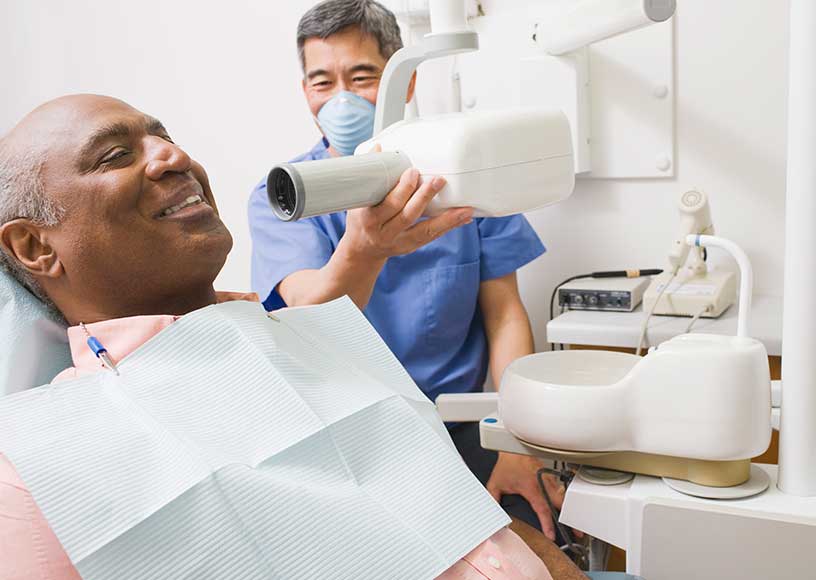10 things your eyes, ears and mouth can reveal about your health
By Anne Warren

When you stay on top of your vision, dental and hearing screenings, you help protect your body from head to toe
Pop quiz — what do diabetes, fall risk and pneumonia have in common? Answer: they’re each related to healthy eyes, ears and teeth.
That’s right — the body parts we often take for granted can reveal a lot about our overall health. That’s exactly why routine visits with the right providers are so essential.
“These health checks are important to help older adults stay ahead of serious problems,” says Christine E. Kistler, M.D., an associate professor of family medicine and geriatrics at the University of North Carolina–Chapel Hill School of Medicine who also serves on an American Geriatrics Society Research subcommittee. “The specialists in these fields will be able to pick up on possible problems that your primary care physician may not be able to see as part of an exam.”
An eye provider, for example, can detect changes in tissues, nerves and blood vessels in your eyes that may signal health issues far from the eyes themselves. A dentist can spot early signs of gum disease, which is linked to heart and lung problems. And an audiologist (hearing specialist) can identify and address hearing problems that could affect your risk of dementia. Once these specialists notice red flags, they can help you get a jump on preventive measures or early treatment.
Need more convincing that these body parts deserve some love and attention? A 2018 report from the Commonwealth Fund found that when older adults get the dental, vision and hearing services they need, they are able to be more independent and can reduce their risk of falls, isolation, depression and visits to a hospital, ER or nursing home.
Here’s a look at some of the sneaky conditions that can be uncovered when you visit a dentist, eye provider or hearing specialist.
Healthy eyes are about more than 20/20 vision
“You may not realize that health problems involving other parts of your body can affect your vision as well,” says William T. Reynolds, O.D., president of the American Optometric Association (AOA). “Eye providers are able to detect more than 270 serious health conditions during annual exams.” These include:
Diabetes. More than 34 million people in the U.S. have diabetes — and 1 in 5 don’t know they have it, according to the Centers for Disease Control and Prevention (CDC). As it turns out, an eye provider can detect warning signs in eye tissue even before they’re revealed in a blood sugar test. That’s because uncontrolled blood sugar can damage the retina and blood vessels behind the eye. “In 2019, optometrists identified signs of diabetes in more than 359,000 patients who weren’t aware they had the condition,” says Dr. Reynolds.
High blood pressure. Also known as hypertension, high blood pressure is another condition that often flies under the radar. But when your eye provider looks into the back of your eye, twists and kinks in the tiny blood vessels of the retina — an early warning sign of high blood pressure — can become apparent.
Skin cancer. Eyelids are easily overlooked when you’re slathering on sunscreen. Eye providers are often the first to notice slight sores or skin changes on the eyelids and along the lash line that could be basal cell carcinoma. This is the most common form of skin cancer, and it can be treated when caught early, according to the Skin Cancer Foundation.
Falls. Research shows that vision loss, particularly when it’s advanced, directly impacts mobility, prompting a person to take shorter steps and fewer steps per minute. This physical decline increases the likelihood of falls.
Eye and vision problems. Less surprising, optometrists are on the lookout for changes that could suggest something more serious brewing with your vision and eye health. This might be an annoying but manageable issue, like dry eye, says Dr. Reynolds. But in older adults, he’s especially tuned into signs of age-related problems that can lead to vision loss, including:
- Cataracts (cloudy spots in your field of vision)
- Glaucoma (blind spots in your side vision)
- Macular degeneration (loss of central vision)
People who have diabetes or high blood pressure are at the greatest risk for developing vision problems later in life, says Dr. Reynolds. Also at risk are people taking medications that have eye-related side effects. But even if you don’t fall into those categories, you may not be out of the woods. During your checkup, talk about all your symptoms — even ones that seem relatively harmless, such as poor night vision or sensitivity to light and glare.
Your stay-healthy move
Schedule an annual eye exam, which is the American Optometric Association recommendation for most people over 60 — even if you’re happy with your vision. “It’s the best way to protect and preserve your sight,” says Dr. Reynolds.
Why you shouldn’t ignore hearing loss
By your late 60s, you have a one in three chance of having a hearing problem, according to the American Geriatrics Society’s Health in Aging Foundation. By age 85, your odds are about 50/50.
Most of the time, hearing loss is a natural effect of age-related changes to the inner ear. But it can also be caused or worsened by wax buildup, certain medications or viral infections. And hearing loss is often found in people with heart disease, diabetes and high blood pressure. The connection isn’t clear, but researchers point out that those conditions are known to reduce blood flow — and your ears require sufficient blood flow to function properly, according to the American Academy of Audiology.
Despite the large number of adults cranking up the TV volume or struggling to follow dinner-table conversations, too many people have decided to simply grin and bear the fading sounds. Hearing loss is the third most common chronic health condition facing older adults, the American Speech-Language-Hearing Association (ASHA) notes. But only 20% actually seek treatment.
That concerns Dr. Kistler. For four big reasons:
Falls. Your eyes and inner ear work together to help you maintain your balance, the American Academy of Audiology explains. Any problem with either of those can increase your risk of falling and breaking a bone.
Missed safety alerts. This is a biggie, says Dr. Kistler. Depending on the severity of your hearing loss, you may miss a car horn, smoke alarm or a shout to “look out” and escape from harm’s way.
Memory functions. A growing body of research links age-related hearing loss to a higher risk of both faster cognitive decline and dementia, says Dr. Kistler. For example, one Johns Hopkins study that tracked adults for nearly 12 years found that mild hearing loss doubled the risk of dementia. Moderate loss tripled the risk, and people with a severe hearing impairment were five times more likely to develop dementia.
The exact reasons haven’t been nailed down yet. But researchers believe that when hearing starts to go, the brain shifts more cognitive resources toward trying to hear and understand others. That leaves less power to do other important tasks. The result? Changes in brain structure and cognitive decline. Also, there may be similar age-related changes in brain structure that cause both hearing loss and cognitive decline.
Social connections. “If you have a hearing aid, you’re more likely to have good social ties and are less likely to be depressed and lonely,” says Dr. Kistler. She notes that it’s literally exhausting to piece together bits and pieces of conversations and ask people to repeat themselves.
“Many people decide that it’s just easier to avoid spending time with friends or family,” she says. “And that’s bad for your emotional and overall health.”
During the pandemic, Dr. Kistler says she has noticed a bit of a silver lining with regard to getting people to pay more attention to their hearing. Today’s public health protocols — wearing masks and standing six feet apart — have made hearing issues tougher to manage without help.
“Usually hearing loss happens gradually,” she explains, “so we don’t notice it right away. But masks and distancing are making many people realize that they’ve been reading lips and taking other steps to compensate for hearing loss.”
Your stay-healthy move
The ASHA recommends that adults over age 50 have a hearing screening every three years.
Speaking of good health — your mouth matters
If you think cavities are just for kids, think again: Your cavity risk increases as you get older, the American Dental Association (ADA) warns. Gums shrink over time, which exposes the tooth’s root and opens the door for decay. Plus, you produce less saliva than you once did, and that’s needed to help keep your pearly whites clean.
But here’s the kicker — there’s another natural symptom of aging that contributes to cavities going unnoticed, according to the ADA. The nerves inside your teeth also shrink over time, making your teeth less sensitive. As a result, you might not realize that something’s up until it’s too late to save the tooth.
“Every tooth saved is useful,” says Dr. Kistler. “It can help anchor other dental work, so we want to save every tooth we can. I tell everyone that there’s no set of dentures as good as your real teeth.”
There are many more health reasons to try and stay ahead of cavities and keep up with regular dental exams, Dr. Kistler says. Among them:
Gum disease. Nearly two-thirds of older adults have some form of periodontitis, a gum infection that can lead to tooth loss. It’s caused by a buildup of plaque —a sticky film composed mainly of bacteria — along and below the gum line. In its early stages, the ADA indicates, gum disease doesn’t cause pain or give any hint that something’s going on. Your dentist, however, will spot the warning signs during your dental cleaning and exam. That’s the best time to take steps to slow the progression and start treatment.
And that’s key, because as gum disease advances untreated, it may lead to infections within other parts of the body. One study in the Journal of Oral Biology suggests that bacteria in the gums entering the bloodstream can cause inflammation and damage. The study authors note that oral bacteria is the most commonly found bacteria in the heart’s arteries.
Longevity. Another study, this one in the journal Periodontology, found that the number of teeth adults have in their late 60s and early 70s is a predictor of how long they will live. To put it more simply: More teeth mean longer life.
Other health conditions. Many health conditions can affect your teeth and gums, the Mayo Clinic report notes. The bone-weakening disease osteoporosis, for example, can lead to tooth loss. Diabetes, which dampens the body’s ability to fight infections, puts people managing diabetes at greater risk for gum disease. Other conditions with ties to oral health include Alzheimer’s disease, certain cancers and rheumatoid arthritis.
Dr. Kistler says it’s important to inform your dentist of any changes in your health. And don’t forget to mention any medications you’re taking. Dry mouth, for example, is a side effect of more than 500 medications and can increase the risk of cavities.
Your stay-healthy move
The ADA recommends seeing your dentist at least once a year. But if you have a health condition like diabetes that can affect oral health, ask your health care team what’s best for you.
